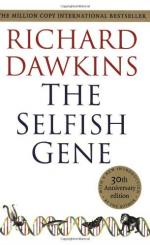
|
| Name: _________________________ | Period: ___________________ |
This quiz consists of 5 multiple choice and 5 short answer questions through Chapter 7.
Multiple Choice Questions
1. What game, played by computers, does Dawkins use as an example of things that can happen automatically based on rules?
(a) Go.
(b) Checkers.
(c) Backgammon.
(d) Chess.
2. What type of animal brains does Dawkins say are most successful?
(a) Animal brians that can analyze input.
(b) Animal brains that can learn.
(c) Animal brians that can creat instinctive action.
(d) Animal brains that can communicate quickly.
3. When a cell divides to make a new cell with identical DNA, what is the process called?
(a) Alleles.
(b) Plasmosis.
(c) Mitosis.
(d) Meiosis.
4. What does Dawkins suggest fooling certain genes into thinking the body is younger might do?
(a) Increase lifespan.
(b) Increase reproduction.
(c) Decrease mutation.
(d) Decrease genetic variation.
5. What does Dawkins postulate would preserve a gene forever?
(a) A being that passed on all its DNA through sexual reproduction.
(b) A being that used only one gene.
(c) An undying being continuing to reproduce.
(d) A gene that caused nothing but remained in the DNA.
Short Answer Questions
1. According to Dawkins, for whom does a bird regulate the number of eggs it lays?
2. Do one-celled animals seem to have purpose and intention, according to the author?
3. What process does the existence of Dawkins' imagined early molecules closely resemble?
4. In the set of bees Dawkins mentions that deal with this disease, what does a second gene the bees have do?
5. What does the author suggest might be better wording than "survival of the fittest"?
|
This section contains 339 words (approx. 2 pages at 300 words per page) |

|




